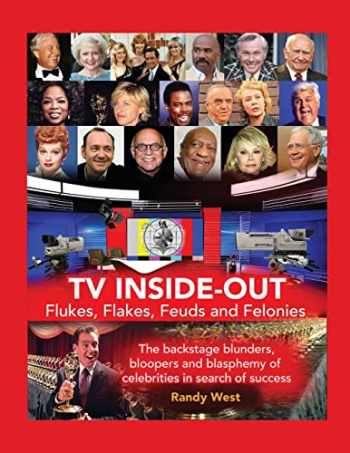Randy West is a highly regarded, very talented voice over artist who has announced a cavalcade of game shows, awards shows and the like. He is also a frequent “warm-up” man, welcoming studio audiences and getting them in the mood to laugh and have a good time. I became most familiar with Randy West through his frequent fill-ins on “The Price Is Right.” Randy was one of several announcers who filled in following the death of Rod Roddy. This was also an on-air tryout for each of the fill-ins, just as it was done in the aftermath of Johnny Olson’s passing in 1985. Rich Fields got the gig to succeed Rod, but I thought Randy was just as good, perhaps a little smoother:
West has written a mammoth tome entitled “TV Inside Out: Flukes, Flakes, Feuds and Felonies”.

Over 500 pages of juicy stories spell out one of my favorite lines from “The Larry Sanders Show” (WARNING! Naughty word ahead!)
LARRY: I’m a talk show host. I’m all fucked up.
West begins the book with a rather lengthy discussion on the psychological profile of people who are in “show business.” It’s worth reading even if it seems unrelated to the gossipy goodies promised on the cover. Because the book has dozens of stories of bad human behavior–people who don’t know how to relate to other human beings, or just don’t bother. And I will say, there is something very true about the social imperfections of anybody who gets into performing of any kind. Even radio has its share of drama queens, rageoholics and the like. And to be clear, radio is “show business” in the same way that a state fair kitchen cutlery salesman or timeshare sales presentation host are in “show business”. But I have known my share of jerks in my medium of choice. And yeah, sometimes I’ve been the jerk.
Of course, my jerkiness is intermittent and mild. For real major league jackassery, you have to go to the pros: Your Jerry Lewises, your James Aubreys (the CBS president who told Jack Benny “You’re through, old man.” I mean honestly? Who talks to Jack Benny like that? Pardon my french, but what an asshole) and the like.
From here a review of this book becomes a review of the stories. So here’s the thing. At least half of these stories were things I’d heard or read about before. Red Skelton’s vulgar rehearsals which were beamed all over Television City in Hollywood. The simple hand signal that got Fred DeCordova banned from the “Tonight Show Starring Johnny Carson” inner circle. The notorious “Newlywed Game” answer Bob Eubanks swore was an urban legend for decades, until somebody found the tape. Yes, these are all familiar stories. But West’s writing style makes them fun to revisit, and frequently new levels of details are unearthed.
And then there’s the vast array of anecdotes I had never heard before. The astonishing goings-on in the studio audience of NBC’s 2000’s “Twenty One” revival. The story of the frustrating career bumps and bruises of Peter Tomarken of “Press Your Luck” fame. The reason Bill Wendell got canned as announcer of the Letterman show only a couple of years into the CBS run.
This is all fascinating stuff if you’re a TV nerd. And it’s one of those books you can read over a long while…one chapter at a time.
The final chapter is a heartbreaking look at the life and career of Ray Combs. Combs was a warm-up artist for the NBC Sherman Hemsley sitcom “Amen.” Which was owned by Carson Productions. Johnny, it is said, heard the huge laughs the warm-up guy was getting and arranged to have him on The Tonight Show:
From that one appearance–a phrase used often in discussing comedians who scored on Johnny’s “Tonight Show”–Combs was hired for the return of “Family Feud” on CBS and in nighttime syndication. I personally loved the way Combs hosted the Feud. Funny, entertaining, and just a great host.
Unfortunately, as happened with almost every daytime game show in the 80’s (save for “Price is Right” or “Wheel Of Fortune”), the Feud’s ratings started drooping. And in 1995, with CBS having cancelled the show and the syndication version in jeopardy (sorry, wrong show), the solution to goose up the new season was…to bring back Richard Dawson.
Thus began a difficult time for Ray Combs that ended, tragically, in his suicide. Randy West worked with Combs on a cable TV series and the two lived in the same apartment complex for a time. The story of this funny, talented man’s demise is told with personal details and thoughts from Combs’ eldest son.
I found “TV Inside-Out” thoroughly entertaining, with bite-size stories about TV, with a slight edge towards game show stories. My only real negative with the book is a brief section in which West discusses radio and is…not terribly kind. I’m not saying that the things he says are false. I just feel bad that most radio companies are cruddy enough to sour the medium’s reputation in this way. I’m certainly glad the one I work for is hunky-dory.
